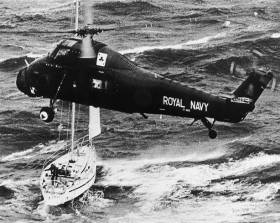Displaying items by tag: Poolbeg, Dublin
Lecture: “Back to the Rock-Fastnet '79” Launches Series at the Poolbeg Y&BC, Ringsend, Dublin
Once again the Friends of Glenua launch their annual winter season of lectures with the 2019/20 programme held in Dublin at the Poolbeg Yacht & Boat Club, Ringsend.
“Back to the Rock- Fastnet '79” is the title of the opening lecture in aid of the RNLI. This it take place on Thursday 17th October (at 8pm) at the venue located on Pigeon House Rd, Dublin 4. There will be an entry contribution of €5 in aid of the RNLI.
The speaker is John O’Donnell who, as a teenager on the yacht ‘Sundowner’, survived the massive Atlantic storm which turned the 1979 Fastnet Yacht Race into the greatest yacht-racing disaster ever witnessed.
In spite of the biggest peacetime rescue effort at sea, 21 people died, and boats were dismasted, abandoned or sunk as the race became a fight to stay alive.
Forty years later O'Donnell remembers the storm. In his illustrated presentation, John will tell the story of ‘Fastnet 79’ from the different perspectives of those at sea, as well as those on land. As he says: “I was lucky to survive the Fastnet Yacht Race in 1979 and I’ve been lucky again in 2019 in finding so many people who would share their stories with me”.
“Back To The Rock” is a gripping and evocative adventure story of hurricane winds and waves the size of houses. It is also a story of fear and courage.
John O’Donnell is a writer and lawyer. His work has been published and broadcast widely. A collection of short stories “Almost The Same Blue” is forthcoming from Doire Press in 2020.
“Back to the Rock” is also the title of his RTE radio documentary on Fastnet '79. Co-produced with Tim Dennehy, it is now available via this podcast link.





























































